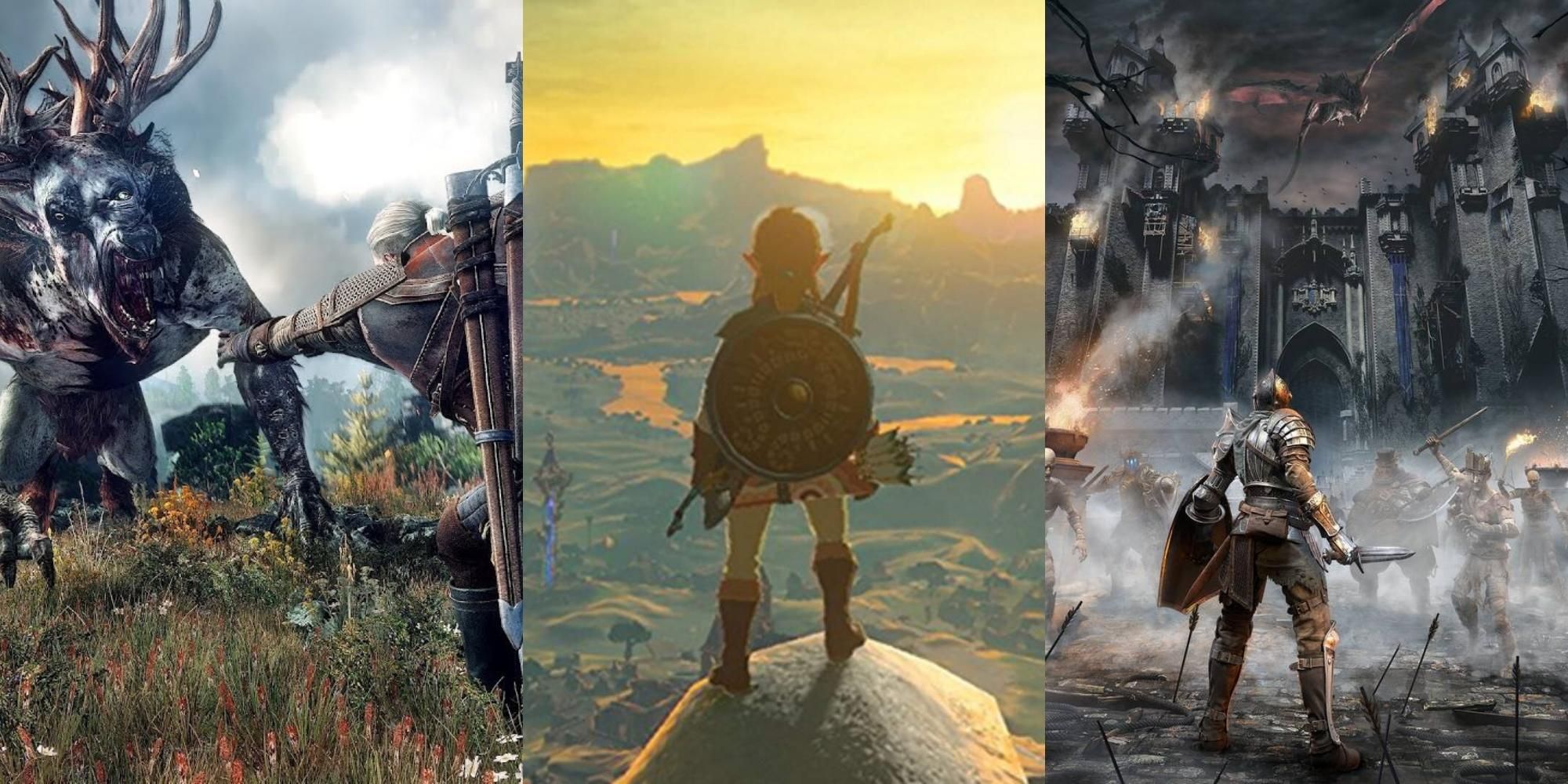
Dive into the Whirlwind: Exploring the Thrilling World of Fantasy Action Games
For generations, the allure of fantasy has captivated our imaginations. From sprawling epic poems to captivating novels and films, we’ve been drawn to worlds brimming with magic, mythical creatures, and daring heroes. It’s no surprise, then, that fantasy action games have carved out a significant and ever-growing niche in the video game landscape. These games offer more than just escapism; they provide a visceral, interactive experience, allowing players to become active participants in fantastical narratives and engage in thrilling combat encounters.
This article will delve into the vibrant world of fantasy action games, exploring their defining characteristics, tracing their evolution, highlighting key subgenres, and examining what makes them so appealing to players. We’ll also touch on some notable titles that have shaped the genre and continue to inspire new creations.
Defining the Fantasy Action Genre:
At its core, a fantasy action game combines elements of both the fantasy and action genres. This means:
- A Fantasy Setting: The game is set in a fictional world often inspired by mythology, folklore, and classic fantasy literature. This world is usually populated by fantastical races (elves, dwarves, orcs, etc.), magical creatures (dragons, griffins, elementals), and powerful artifacts.
- Action-Oriented Gameplay: Combat is a primary focus, often featuring real-time battles, fast-paced movement, and a variety of offensive and defensive options. Players actively control their character, executing attacks, dodging enemy blows, and utilizing special abilities.
- Character Progression: Players typically have the ability to improve their character’s attributes, skills, and equipment as they progress through the game. This can involve leveling up, acquiring new weapons and armor, learning spells, and mastering combat techniques.
- Story and Lore: While action is a central element, a compelling narrative and rich lore are often crucial to the overall experience. Players are typically immersed in a story with clear objectives, engaging characters, and meaningful choices that can impact the game world.
A Journey Through Time: The Evolution of Fantasy Action Games:
The seeds of the fantasy action genre can be traced back to early action RPGs and adventure games. Titles like Golden Axe (1989) and Ghosts ‘n Goblins (1985) combined side-scrolling action with fantasy themes and simple character progression, laying the groundwork for future developments.
The 1990s witnessed a surge in popularity for isometric action RPGs, with Diablo (1997) arguably setting the standard. Its addictive gameplay loop of slaying hordes of monsters, collecting loot, and upgrading equipment resonated deeply with players, establishing a formula that many games would follow.
The transition to 3D brought new possibilities for immersion and combat complexity. The Legend of Zelda: Ocarina of Time (1998) revolutionized 3D action adventure, influencing countless titles with its lock-on targeting system and intuitive combat. Dark Souls (2011) emerged as a modern landmark, popularizing a challenging and methodical combat system that demands precision and strategic thinking.
Today, the fantasy action genre is diverse and vibrant, encompassing a wide range of styles and experiences. From expansive open-world adventures to focused character-action titles, there’s something for every taste.
Exploring the Subgenres: A World of Possibilities:
Within the broader category of fantasy action games, several subgenres offer distinct gameplay experiences:
- Action RPGs (ARPGs): These games emphasize character progression, loot acquisition, and build customization. Diablo, Path of Exile, and Grim Dawn are prime examples, offering endless replayability as players experiment with different character builds and chase powerful gear.
- Character Action Games: Focused on stylish and challenging combat, these games prioritize player skill and mastery. Devil May Cry, Bayonetta, and Ninja Gaiden exemplify this subgenre, rewarding players who can execute complex combos and master the intricacies of their character’s moveset.
- Souls-like Games: Inspired by the Dark Souls series, these games are known for their challenging difficulty, methodical combat, and intricate world design. Elden Ring, Bloodborne, and Sekiro: Shadows Die Twice are prominent examples, demanding patience, perseverance, and a willingness to learn from mistakes.
- Open-World Action RPGs: These games combine the freedom and exploration of open-world games with the character progression and combat of ARPGs. The Witcher 3: Wild Hunt, The Elder Scrolls V: Skyrim, and Kingdoms of Amalur: Reckoning offer vast and immersive worlds to explore, filled with quests, secrets, and challenging encounters.
- Hack and Slash: A more direct and visceral subgenre that focuses on overwhelming the enemy with sheer force. Games like Dynasty Warriors and Musou titles generally fall into this category.
The Allure of Fantasy Action: Why We Love These Games:
The enduring popularity of fantasy action games can be attributed to several factors:
- Escapism and Immersion: These games offer a chance to escape the mundane and immerse ourselves in fantastical worlds filled with wonder, danger, and adventure. We can become heroes, explore ancient ruins, battle mythical creatures, and shape the destiny of entire kingdoms.
- Empowerment and Progression: The ability to customize and improve our characters provides a sense of empowerment and accomplishment. As we level up, acquire new skills, and equip powerful gear, we feel like we’re truly making a difference in the game world.
- Challenging Combat: The action-oriented gameplay offers a satisfying challenge, requiring us to master our character’s abilities, learn enemy patterns, and develop strategic thinking. Overcoming difficult encounters provides a sense of accomplishment and mastery.
- Compelling Stories and Lore: The rich narratives and intricate world-building of fantasy games draw us into their stories and make us care about the characters and their fates. We become invested in the game world and want to uncover its secrets and explore its mysteries.
- Social Interaction: Many fantasy action games offer online multiplayer modes, allowing us to team up with friends and other players to tackle challenging content, compete in PvP battles, and share our experiences. This social aspect adds another layer of engagement and enjoyment to the genre.
Notable Titles That Shaped the Genre:
Numerous games have left their mark on the fantasy action genre, influencing future titles and shaping the player experience. Here are a few notable examples:
- Diablo (1997): Defined the isometric ARPG formula with its addictive gameplay loop and dark fantasy setting.
- The Legend of Zelda: Ocarina of Time (1998): Revolutionized 3D action adventure with its intuitive combat and memorable world.
- Devil May Cry (2001): Pioneered the character action genre with its stylish combat and over-the-top action.
- The Elder Scrolls V: Skyrim (2011): Popularized the open-world action RPG formula with its vast and immersive world and unparalleled freedom.
- Dark Souls (2011): Redefined difficulty in action games, popularizing a challenging and methodical combat system.
- The Witcher 3: Wild Hunt (2015): Set a new standard for storytelling and world-building in open-world action RPGs.
- Elden Ring (2022): Blended the Souls-like formula with a vast open world, creating a uniquely challenging and rewarding experience.
The Future of Fantasy Action:
The fantasy action genre continues to evolve and innovate, with developers constantly pushing the boundaries of gameplay, graphics, and storytelling. We can expect to see more games that blend different subgenres, experiment with new combat mechanics, and create even more immersive and engaging worlds.
Virtual reality and augmented reality technologies could also play a significant role in the future of fantasy action games, allowing players to experience these worlds in a completely new and visceral way. The possibilities are endless, and the future of fantasy action gaming looks brighter than ever.
In conclusion, fantasy action games offer a unique and compelling blend of action, adventure, and escapism. They allow us to become heroes, explore fantastical worlds, and engage in thrilling combat encounters. With its rich history, diverse subgenres, and constant innovation, the fantasy action genre will undoubtedly continue to captivate players for years to come. So, grab your sword, ready your spells, and prepare to dive into the whirlwind of fantasy action!

